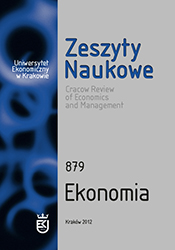Polityka fiskalna i monetarna zakonu krzyżackiego
The Fiscal and Monetary Policy of the Teutonic Order
Author(s): Łukasz ŻurekSubject(s): Economy
Published by: Wydawnictwo Uniwersytetu Ekonomicznego w Krakowie
Keywords: the Teutonic Order; monetary policy; tax system; the Middle Ages
Summary/Abstract: The Teutonic Order, as an institution acting both in the sacrum and profane spheres, permanently influenced the economic development not only of Western Europe, where its centers were located, but also and even more importantly Prussian territory, and by virtue of the trade the knights carried out, the whole of Europe. The fiscal and monetary policy of the Teutonic Order was treated instrumentally by the organisation’s authorities. It helped the Order to achieve its primary goals, namely the power of community and the wealth that grew out of it. A stable currency and adapting of the tax system to the prevailing socio-economic conditions were not favourable enough circumstances for the Order to make the reforms required to not only progress but also ensure the stable functioning of the body politic. The worsened economic situation, deteriorating at the hands of war, revealed negligence in handling monetary stability and the already too high tax burden increased recession, which contributed to the fall of the Order and the secularisation of the state. The efficient rule of the monastic state observed until the 14th century was complemented by equally efficient monetary and tax policy, and benefited the order in that it induced general economic growth in Prussia. However, the lack of suitable tax reforms and inappropriate measures in the monetary sphere by depreciation and deterioration of money in the 15th and 16th centuries led to the gradual fall of the monastic state.
Journal: Zeszyty Naukowe Uniwersytetu Ekonomicznego w Krakowie
- Issue Year: 879/2012
- Issue No: 03
- Page Range: 81-91
- Page Count: 11
- Language: Polish

